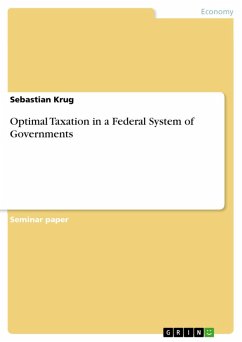Research Paper (undergraduate) from the year 2005 in the subject Business economics - Economic Policy, grade: 1,7, Friedrich-Alexander University Erlangen-Nuremberg (Finanzwissenschaften), course: The reform of federalism, language: English, abstract: The term federalism derives from the Latin word "foedus" and is rendered in the words "alliance" and "treaty" or "agreement". Federalism describes a national form of organization consisting of at least two members, who are joined together by means of a voluntary agreement or treaty into a unitary state having its own national characteristics,1 but without discarding the distinctive national attributes. Through this coalition the individual / federal states surrender their jurisdiction and individual powers to the unitary state. In return, the federal system makes sure that the unitary state and the individual states control and assist each other mutually when fulfilling their obligations.2 Federalism is especially characterized in that assignments, revenues and expenses are distributed on several national levels.3 Furthermore, federalism must safeguard a certain unit from a (foreign) political, economic, military and socially cultural point of view.4 Basically, federalism implements an equilibrium between decentralization and centralization.5 Aided by expenses and the division of assignments, revenues and expenditure, an optimal allocation is put from theory into practice.6 In Germany, the 16 federal states (Länder) make up the federal state, the German Federal Republic. Powers to and responsibility for national assignments in the government and governmental management, legislation and the administration of justice is divided between the federal state and the individual states. The German constitution ensures that in addition to this vertical division between the federal and the individual states' authorities, a horizontal division of powers exists between the legislative, executive and judicial branch, thereby forming the basis of a double division of powers.7 Current discussions concerning the German federal reform, more precisely defined the so-called "Kommission von Bundestag und Bundesrat zurModernisierung der bundesstaatlichen Ordnung"8 are mainly centred on the reorganization of the assignments of the federal and the individual states. In the course of these discussions special attention is paid to the reorganization within the areas of powers and responsibility of both levels, especially regarding education, representation of EU-countries, a readjustment of the extent of the laws, which the federal state is obliged to approve, and the equalization of tax rates between the federal states.
Dieser Download kann aus rechtlichen Gründen nur mit Rechnungsadresse in A, B, BG, CY, CZ, D, DK, EW, E, FIN, F, GR, HR, H, IRL, I, LT, L, LR, M, NL, PL, P, R, S, SLO, SK ausgeliefert werden.









